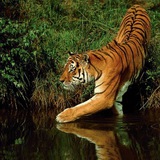
Telegram-канал wildlifen - Wildlife
 20792
20792
Join us as we explore the wilderness and share the beautiful scenery of nature! For all questions: @magellanvs

 20792
20792
Join us as we explore the wilderness and share the beautiful scenery of nature! For all questions: @magellanvs

Tapir proboscis is needed not only for better perception of odors.
Читать полностью…
A two-day-old calf studies the sounds of the vast world
Читать полностью…
Even inside the cut leaf, active life continues.
The chloroplasts in the roller move inside the cells in search of organic substances for photosynthesis.

The parrot kea Nestor notabilis is endemic to New Zealand, outwardly similar to a falcon or a small eagle with a large head and a predatory, downward-curved beak. Despite its relatively small size, kea has remarkable strength and flies perfectly.
Body length about 45 cm, weight 600-1000 g. The color of the plumage is dominated by olive green, sometimes slightly brownish color, under the wings the feathers are painted bright red. Paws are gray. The name is onomatopoeic, derived from the loud cry: "keee-aa".
They are known for their exploratory behavior and the ability to deftly use their beak, which, combined with developed curiosity, makes them a scourge for locals and entertainment for tourists. Nicknamed the "clowns of the mountains", they do not miss the opportunity to explore the contents of backpacks or cars that they liked.

Duikers or crested antelopes live in sub-Saharan Africa.
Читать полностью…
When my dog gets tired on the beach, she digs a hole and enjoys the ocean.
Читать полностью…
Komodo monitor lizard (aka Komodo dragon) Varanus komodoensis is one of the most unique animals living in natural conditions. This lizard looks like some kind of folklore mythical creature.
This monitor lizard, which has a very impressive appearance, has a fairly strong neck, powerful shoulders, but a relatively small head. The big tail serves him not only as a support when moving, but also as a weapon for clarifying the relationship between rivals.
The body size of an adult male can reach 3 m, and the weight is from 80 to 180 kg, females are somewhat smaller.
Despite their seeming clumsiness, these lizards run at speeds up to 40 km/h, sometimes competing with deer and antelopes. The monitor lizard, hunting, even overtakes these ungulates.
The Komodo lizard lives in southeast Asia, including the scattered islands of the archipelago of the Lesser Sunda Islands.

Owls are able to see prey in the grass from a height of more than 3 kilometers.
Читать полностью…
The plush-headed jay Cyanocorax chrysops lives in southwestern Brazil, Bolivia, Paraguay, Uruguay and northeastern Argentina.
It is an elegant bird of medium size, with dark plumage and a creamy-yellow breast; the voluminous tail is also cream-colored - from the inside out and at the end. On the head is a tuft in the form of a plush cap.
Systematically, magpies and cuckoos are considered the closest relatives of jays. Unlike other ravens, which are distinguished by a strong physique, jays are light and elegant. The streamlined body, small beak, thin prehensile paws and, especially, a long tail make them look like a lightweight magpie.
It is noteworthy that the blue color of the feathers in jays is not due to coloring substances, but to the refraction of light in the microscopic grooves of the fan. If the pen is crushed, its microstructure will be broken and the blue color will disappear